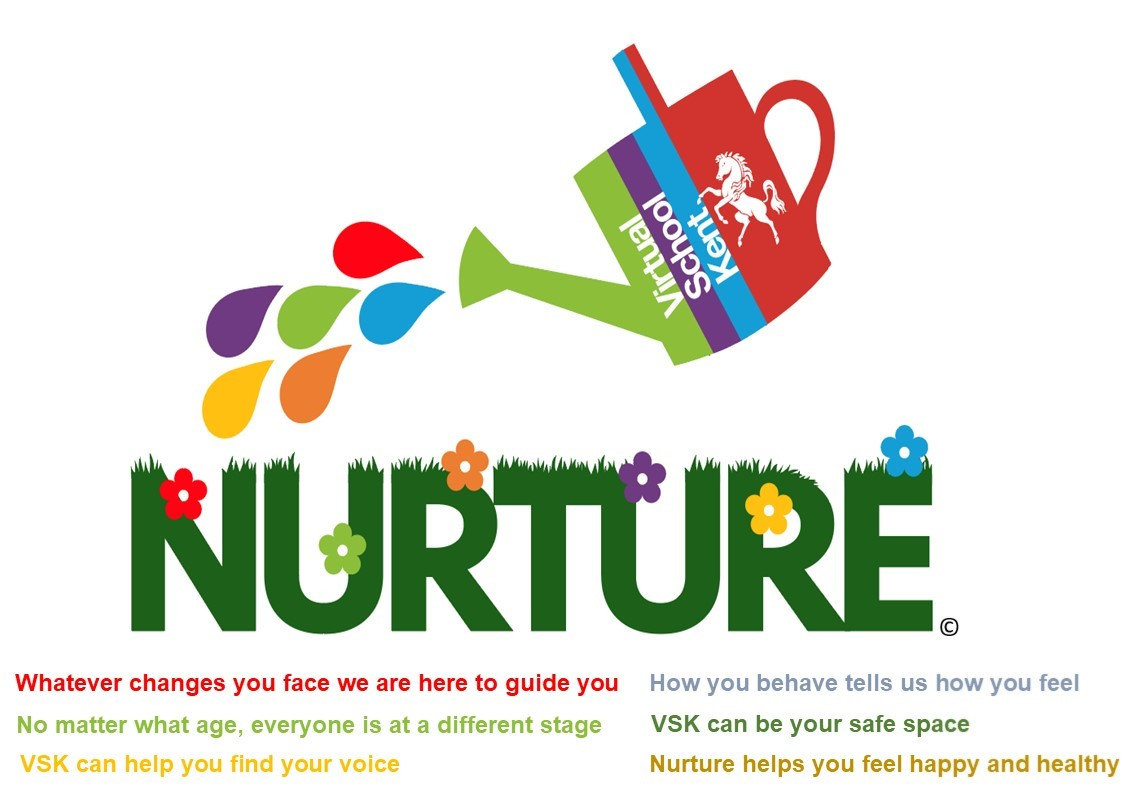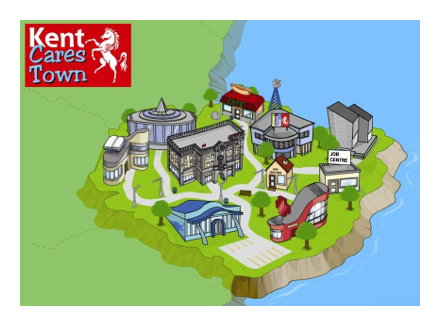
Nurture is all about the people around you and how they help you to grow and become the best person you can be. Nurture is also about the environment that you are growing up in, this might be your school, your community and your friends. Together all of these can influence positive wellbeing and behaviour.
The National Nurturing School Programme features 6 principles. Everyone in Virtual School Kent is working hard to make sure we are following the principles in our work with young people, schools, other agencies, as well as our own staff.
The VSK apprentices have worked with young people to put the 6 key nurture principles into words for young people, by young people.
The 6 principles are:
Whatever changes you face; we are here to guide you.
Anyone may have changes in their lives which may be difficult to cope with. VSK are always here to support you and help you cope with these changes.
No matter what age, everyone is at a different stage.
Not everyone achieves things at the same time or the same age, VSK are here to help you achieve when you are ready.
VSK can help you find your voice.
Having your voice heard is important and VSK will help you to make sure your wishes and feelings are always heard.
How you behave tells us how you feel.
It’s not always easy to talk about how you are feeling but sometimes how you behave shows us instead. VSK is here to support you with how you are feeling.
VSK can be your safe space.
Although VSK isn’t a real-life school, we are always here for you.
Nurture helps you feel happy and healthy.
The VSK team are here to make you are getting everything you need to make sure you are happy, healthy and safe.
As well as working towards the Six Principles of Nurture, VSK has introduced a new tool to help your teachers support your wellbeing and learning.
The Boxall Profile is an assessment that helps your teachers and VSK staff understand your needs and make sure that you are supported in the right way. It’s not a test for you though! By looking at the way you play and socialise with your class mates and learn and behave in class, your teachers will be able to create targets for you and plan the extra support you might need. These will, hopefully, help you to feel happier and more settled at school and access your learning better. Your teachers will work with VSK staff to check these targets, for example at your PEP meeting, and develop new ones when you need them.
If you would like more information about the Nurture Principles, you can look on Nurture UK website; or contact us.
Within Virtual School Kent, there are lots of people to support you as you move through secondary school.
Your Virtual School Headteacher is employed by Kent County Council to monitor how schools in the area are supporting children in care and give them advice about how to help you get the most from school and do well in exams.
Virtual headteachers are very experienced and oversee the educational progress of all children looked after by that local authority. The Virtual School Headteacher has in-depth knowledge that means they can give extra support to designated teachers.
The Headteacher is supported by a senior leadership team of deputy head teachers.
There are two Deputy Head Teachers within Virtual School Kent. Between them, they cover all of Kent and Early Years, Primary, Secondary and Post-16 age groups.
They manage a team of workers who work with young people, take a lead in planning the support available to children and young people in care and ensure that Virtual School Kent is doing everything it should be.
Each area has its own Assistant Head Teacher. They monitor the progress of young people in care and make sure there is support available if you need it. Assistant Head Teachers are also responsible for supervising the training of designated teachers, schools, social workers, foster carers and school governors. They act as a champion for children in care by challenging your teachers to make sure that the education you are receiving is as good as it can be.
There are lots of Education Support Officers who are based in different parts of Kent and it’s their job to work with schools, Social Workers, and young people to make sure you are getting the most out of your education and are being given the best opportunities to be successful. They often attend your PEP meetings, your Children in Care reviews and any other meetings where your education is likely to be discussed. ESOs often work one to one with those of you that may need some extra support with your learning, if you change schools or even if you just need a mentor to support you whilst things feel a bit wobbly. Sometimes it’s good to have someone to speak to who isn’t connected to your school and isn’t your Social Worker or your foster carer who can help you have your voice heard, especially if you feel things aren’t going the way you’d like them to with your education. ESOs can do that as well. Although you all attend different schools around the county, Education Support Officers track and monitor your progress in case you need any extra support.
These officers support you as you move through Year 10 and Year 11. They provide you with advice about education and work-related training that matches your needs.
The FELO role is to provide the link person for Foster Carers, Social Workers, Independent Reviewing Officers and other services to support you with education questions and issues. The FELOs in the teams will track young people when they enter care so that they know where you are at school and also where you live. They try to attend meetings and offer support with advice, resources and services to enable you to get the most out of education and provide information about other services in the area that you can access if needed. The FELO in each area keeps involved in local Support Groups for foster carers and sends out resources to support different school year groups in their area.
Education Welfare Officers work with schools and other educational providers to monitor the attendance of young people in care at school. They support you if your attendance begins to fall so you can get the best out of your education.
These officers and assistants work in the VSK offices to support the other staff, arrange special funding and tuition as well as lots of other things that help the team to run smoothly.
Every school must have a Designated Teacher – and they should make sure that you know exactly who they are and how they can support you in different ways. This could be help with some academic subjects or it might mean a listening ear. Some young people don’t want to stand out and Designated Teachers have training to help them understand these feelings.
Your Personal Education Plan or PEP is all about how you are doing at school. Your PEP should be a way of helping you achieve your goals. You will have a PEP meeting when you come into care – and then at least three times a year from then on. It is very important that your voice is heard. Even if you don’t feel comfortable attending the PEP meeting, then you can ask an adult to give your views instead. At the PEP meeting your achievements are recorded and targets set to help you achieve your goals which are reviewed at the next meeting to see how you are getting on and to make sure that everyone supporting you is completing their actions.
VSK trains schools on PEPs and how important they are because everyone working with you wants you to get the most out of this experience and help you towards having the best education possible.
Worried about something at school or want some advice?
If you are worried about something related to school, always speak to someone you trust – your carer, a teacher, your social worker or a member of your family.
But there is also lots of good advice available online. Try the links below…
Exams coming up and want some last-minute revision tips?
- BBC Bitesize can help you with your learning right through secondary school
Do you need support or advice for problems at school? Whether it’s coping with stress, exam preparation or something else, try these links.
Experiencing bullying at school? Click on the links below for advice (but remember to speak to someone you trust too).
Navigating the internet and social media safely can be tricky. Learn more about keeping yourself safe online using these links.



